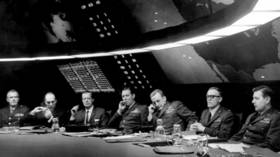Ignorance of Russia among Western elites is dangerous

With Ukraine again at the forefront of a recent peak in tensions between Russia and the West, former Swedish Prime Minister Carl Bildt has pitched in on the debate, condemning Moscow and calling for the West to toughen up.
For those familiar with his hawkish politics, so far, so predictable. But taking a closer look is still worthwhile, because Bildt’s assertions are not unique, and are emblematic of a shopworn repertoire that is increasingly popular among neo-Cold War hardliners. Bildt was once also a key figure in shaping the EU’s policies in Eastern Europe, including those that led to the current confrontation with Russia over Ukraine, as well as being a frequent commentator and think tank chair with a good deal of influence.
The former politician’s glaring factual errors and, it seems, self-serving biases represent more than his own shortcomings. Instead the fact that he gets away with them so well points to systemic problems in Western policy-making and public debate: Bildt’s output is a useful indicator of flaws in Western thinking. Understanding them could help avoid confusion and apoplexy between East and West.
His most recent intervention has come, in long form, via an editorial with Project Syndicate and, in a short version, on Twitter. In both cases he has managed to frame an astonishing number of things inaccurately.
On Twitter, Bildt has asserted that “the Putin narrative on 2014 is of course all wrong,” to then offer his own take: “What happened in Kiev was that President [Viktor] Yanukovich just fled the country. He could have stayed and respected the agreement he had signed. And then events followed the letter of the Ukrainian constitution and the agreement.”
Clearly, Bildt is alluding to the final phase of the clash between Yanukovich’s government and protesters that took place between late November 2013 and late February 2014. As is well known, Yanukovich did flee. Yet Bildt’s assertion that he could “just” have stayed is flat wrong. In reality, whatever your position on Yanukovich’s behavior when in power (full disclosure: abysmal, in my view) it is a fact that at that point he was in physical danger and did not have a realistic option of simply abiding by the agreement, as Bildt falsely maintains.
This is no minor point, because the former Swedish foreign minister doesn’t only misrepresent Yanukovich’s situation, he also implicitly embellishes the actions of the former president’s opponents: In reality, a significant and – as it turned out – decisive faction of the protesters, led by the militant far right, chose not to accept the compromise that had been reached with the help of France, Germany, Poland, and Russia.
Yanukovich may well have had other reasons to flee, too. But it is clear that Bildt simply omits the role that the president’s opponents played in deliberately sabotaging an agreement that could have allowed Ukraine to overcome Yanukovich’s regime in a peaceful transition. The blueprint existed and had been accepted by all sides involved. It was trashed by both a faction of the protesters and Yanukovich.
One can only speculate why Bildt gets something so clear so wrong. Is he still reluctant to recognize the full and detrimental influence of Ukraine’s far right? Is he incapable of accepting that “his” side also contributed to the violence of the Ukrainian regime change and its aftermath?
Bildt’s claim that afterwards the Ukrainian constitution was flawlessly observed is also factually wrong. In reality, it is common knowledge – among those in favor of the changes as well – that, once the agreement had been sunk, the constitution could not be observed “to the letter.” Instead, the Ukrainian parliament used a highly creative set of moves to officially deprive Yanukovich of his post that stretched strict legality beyond breaking point. In similar situations, such ruptures are not unusual, and, at that moment, there may have been no realistic alternative left. It is all the more astonishing to find Bildt in simple denial of a reality he could try to justify but ought not to simply falsify.
Much longer than his misleading tweet, Bildt’s recent piece for Project Syndicate also features oddly obvious errors. Let’s look at three examples. The most flagrant misrepresentation is his contention that a recent essay by Russian President Vladimir Putin on the historical relationship between Russia and Ukraine amounts to a call for a “greater Slavic empire.”
The essay is available – in English as well – on the website of the Russian Foreign Ministry. Much of it is open to argument; obviously, Putin’s principal argument that Ukrainians and Russians are really one people included (full disclosure: I disagree). But there is no call for anything remotely like a “Slavic empire,” neither explicitly nor implicitly. Bildt is talking strictly nonsense here. That matters because in today’s world, we have enough genuine disagreements. There is no need to add more by misunderstanding and misrepresenting each other’s view, whether by mistake or deliberately.
Bildt also serves up an old red herring, claiming, in essence, that NATO cannot stop expanding without infringing the sovereignty of non-NATO states. His argument is that the latter presupposes those states’ right to achieve membership. Like so many others, he is badly confused: NATO, as a matter of fact, accepts new members only by choice through unanimous consent of old members. It is, in other words, a self-selecting club.
That fact obviously clashes with the bizarre but popular idea that any non-member state has a right to be admitted, usually vaguely confused with the right to apply, as if the two were really the same in practice.
In reality, what we can logically say about sovereignty and NATO is, actually, the following: Every non-member state may have a sovereign right to apply to become a member. But as the old members together have the right to reject the application, the right to apply and the right to become a member are, clearly, two very different things. In fact, one could make a more convincing argument that the sovereignty of already existing NATO members is infringed when commentators like Bildt deny their right to say no to new admissions, individually or in principle.
Finally, Bildt maintains that Putin “has… abandoned further dialogue with Ukraine’s leaders.” That is a statement that suffers from what seems a deliberate lack of context. In fact, Russia has explained its position repeatedly. It is no longer willing to accept two things: First, that Ukraine’s leaders systematically sabotage the implementation of the Minsk II agreement and the Steinmeier Formula, that is, the already existing path to peace, which Ukraine has, actually, signed up to.
And, second, that Western leaders let Ukrainian leaders get away with this transparent tactic. Again, Bildt may disagree with Moscow’s view; he may support Kiev’s obstructionism. But simply pretending that Moscow’s policies have no reason except Putin’s personal moods is dishonest and useless. It only muddies the waters, when real dialogue requires clarity as well as the ability to recognize one’s own agency and responsibility.
In sum, Bildt’s recent intervention regarding Ukraine, Russia, and the West are largely demagogic. Bildt represents what is already a bad tradition among Western neo-Cold Warriors: Sloppy with the facts and clearly selective and biased in the presentation of those he does not simply leave out, his main aim seems to be mobilizing and point-scoring. He is, in other words, what the Soviets used to call a “fighter on the ideological front,” just for a West grown complacent on its own post-Cold War unilateralism. It’s time to leave this dated way of thinking behind.
The statements, views and opinions expressed in this column are solely those of the author and do not necessarily represent those of RT.
The statements, views and opinions expressed in this column are solely those of the author and do not necessarily represent those of RT.













